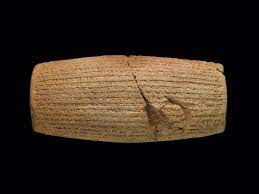I find it difficult to understand the Bible. There, I’ve said it.
That doesn’t mean I ignore the Bible. All that means is that I work hard to make sense of it. Why? Because it’s the most unique book ever, as I’ve said in my discussions of the transmission and translation of the Bible.
This year, Soo Choo, one of our columnists, has written about God and sparrows. Our pastor, Revd. Thomas has also spoken of sparrows. Their point is, we can trust that God who cares for sparrows will care for us.
There are no sparrows in Ezra-Nehemiah. But there are pots and pans, bowls, cups, censers. The Babylonian King Nebuchadnezzar had taken them from the Jerusalem Temple. The Persian King Cyrus returned them. The Bible tells us how many there were.
We know from “the Cyrus Cylinder” recovered in the 19th century from the Marduk Temple of Babylon – not far from what may have been the Tower of Babel mentioned in Genesis 11 – that Cyrus returned religious objects, including idols, to peoples forcibly removed by the Babylonians.
But the Jerusalemites had no idols. There was the Ark of the Covenant, but we hear nothing of it. The only things Cyrus returned were 5,400 kitchen and dining tools.
Most of those who returned were born in exile, in Babylon. They joined the travellers to Jerusalem because their families made them do it, or because their community had taught them about the ‘special position’ of Jewish people in God’s plans for the world. They knew the 5,400 tools were God-owned, remnants, just like themselves.
What was the point of returning and restoring the ruined Temple when it would not have its centrepiece, the Ark of the Covenant? What was the point of resuming Temple sacrifices after so many years of non-doing?
The answer, to put it bluntly, is part of the mysteries of God. If there was no Temple, there would be no life and death of Jesus as we know it.
What we need to understand is that the Biblical writers wrote “salvation history,” not the type of history we moderns expect. We have to read every Bible passage in the arc of the overall plan of God.
We have to ‘see’ that the Bible is about the conflict between the city of man, represented by Babylon, and the city of God, represented by Jerusalem in Revelation chapter 18, and God’s promise of a mediator, who will restore us to right relationships with Him (Genesis 3:15).
That’s what the Biblical writers see and show in all their accounts of history. In God’s plan, it was necessary for a ‘remnant’ to return to Israel.
That’s why the first verse in Ezra refers to the prediction of prophet Jeremiah that they would return. Also, prophet Isaiah, about a hundred years before Jeremiah, had prophesied the return, even naming Cyrus as the initiator (see Jeremiah 51 and Isaiah 41-45).
There are two other ‘problems’ I’d like to consider.
First, Jeremiah said the exiles would return after 70 years (Jeremiah 25:11-12). However, the return began less than 70 years after the exile. This can only mean that God, in his mercy, returned them earlier.
Second, whose decision was it to arrange for the Jews to return to Jerusalem? Was it the decision of Cyrus, or of God? Of course, the corollary to this question is, whose decision was it to forcibly remove them from Jerusalem in the first place?
The prophet Amos was in no doubt about who causes calamity. He said to the Israelites, “Does disaster come to a city, unless the Lord has done it?” (Amos 3:6b) Yet he railed against his hearers for their acts of injustice.
Any speech about man and God reflects what we think of “human agency” and “God’s sovereignty.” The biblical teaching and the conclusions of Bible readers over the centuries is consistent. The Bible teaches both.
The death of Jesus is the supreme example. Those who mocked, flogged, and crucified Jesus are guilty of sin. Yet, those events were part of God’s will. (Look up John 19:31-37 in a reference Bible.)
The Jewish historian Josephus, writing hundreds of years after the events described in Ezra-Nehemiah, suggested that the leaders of the Jews had shown Cyrus Isaiah’s prophecy, which included his name (Isaiah 45:1), and Cyrus responded by ‘making it so.’
That is plausible, but not necessary. What is more important is whether we should appeal to the government of our day to “do right” by pointing to Bible verses, just like Muslims often quote from writings they consider sacred, like the Quran and the Hadith. What do you think?
To learn more about Rama, click here.



Pingback: Come eat, drink, listen, live - Bangsar Lutheran Church